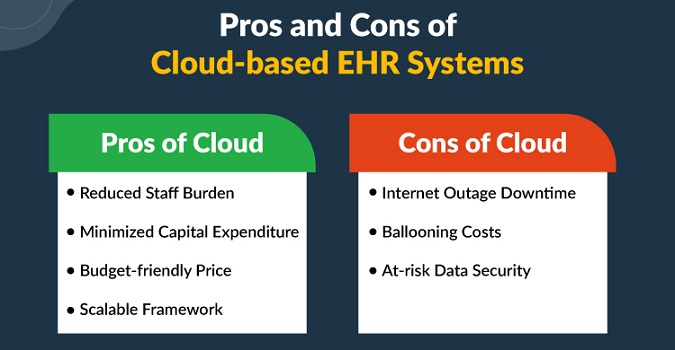In today's fast-paced environment, the Information Technology (IT) sector stands out as one of the…

Pros and Cons of Cloud-Based EHR Systems for Medical Practices
Electronic Health Record (EHR) systems have revolutionized the way healthcare providers manage patient data. With the advent of cloud technology, EHR systems have become even more powerful, allowing medical practices to access patient records securely from anywhere in the world. Healthcare providers can improve patient outcomes with cloud-based EHRs but they also come with potential drawbacks. In this article, we’ll explore the pros and cons of cloud-based EHR systems for medical practices.
Pros of Cloud-Based EHR Systems
Accessibility and Convenience
One of the significant advantages of cloud-based EHR systems is accessibility. Providers can access patient records securely from any device with internet access, regardless of location. This means that healthcare providers can manage patient care remotely, making it easier to provide quality care to patients outside of the office or hospital setting. Additionally, cloud-based EHR systems allow multiple users to access records simultaneously, improving collaboration and communication among healthcare providers.
Cost Savings
Cloud-based EHR systems can help medical practices save money. By eliminating the need to purchase and maintain expensive hardware and software, cloud-based EHR systems reduce capital expenditures significantly. Providers also save on IT support, as the cloud provider manages system maintenance and updates. Cloud-based Electronic Health Record systems often operate on a subscription-based model, allowing practices to pay for what they need and scale up or down as necessary.
Security
Cloud-based EHR systems offer enhanced security features compared to on-premise solutions. Cloud providers have teams of security experts who continuously monitor the system for threats and vulnerabilities, reducing the risk of data breaches. Additionally, cloud providers back up data regularly and store it in multiple locations, ensuring that data is safe and accessible even in the event of a disaster.
Scalability
Cloud-based Electronic Health Record systems offer scalability, allowing medical practices to adjust their IT needs as their practice grows or changes. Cloud providers offer flexible storage options, making it easy to add or remove storage as necessary. Additionally, cloud providers can quickly deploy new features and updates, allowing practices to keep up with new technologies and stay ahead of the competition.
Cons of Cloud-Based EHR Systems
Internet Dependence
Cloud-based Electronic Health Record Systems require a stable internet connection to function correctly. In areas with poor connectivity, providers may experience slow or unreliable system performance, affecting patient care. Additionally, system downtime or outages can prevent providers from accessing patient records, leading to delays in patient care and potential data loss.
Data Security
While cloud-based Electronic Health Record Systems offer enhanced security features, some medical practices may be hesitant to store sensitive patient data on the cloud due to concerns about data breaches. Providers must ensure that their cloud provider meets stringent security standards and that data is encrypted both in transit and at rest. Additionally, providers must have appropriate measures in place to prevent unauthorized access to patient records.
Customizability
Cloud-based Electronic Health Record Systems often have limited customizability compared to on-premise solutions. Providers may be unable to customize the system to meet their specific needs or may be limited in the number of third-party integrations they can use. This can lead to workflow inefficiencies and make it more challenging to provide quality patient care.
Dependency on Cloud Providers
Cloud-based EHR systems are dependent on cloud providers to maintain and update the system. In the event that the cloud provider experiences financial difficulties, providers may be left without access to patient records or may experience extended downtime. Additionally, providers may be limited in their ability to switch cloud providers due to data migration costs and potential data loss.
Conclusion
Cloud-based EHR systems offer several advantages, such as convenience, cost-effectiveness, scalability, collaboration, and security. However, they also come with certain cloud computing challenges, such as reliance on the internet connection, data ownership and control, integration challenges, data privacy and security, and vendor dependency.
Medical practices must carefully consider the pros and cons of cloud-based EHR systems before implementing them. Medical practices must ensure that they have a clear understanding of their vendor’s policies, contractual agreements, and regulatory compliance to avoid any potential legal or regulatory issues.
How MedicalIT.Services can help?
Whether you need a cloud email service or a personal cloud solution, we are helping the medical industry by providing cost-effective managed cloud services including email, server application hosting, hybrid & private cloud, data backup, and migration solutions.
Also Read:




